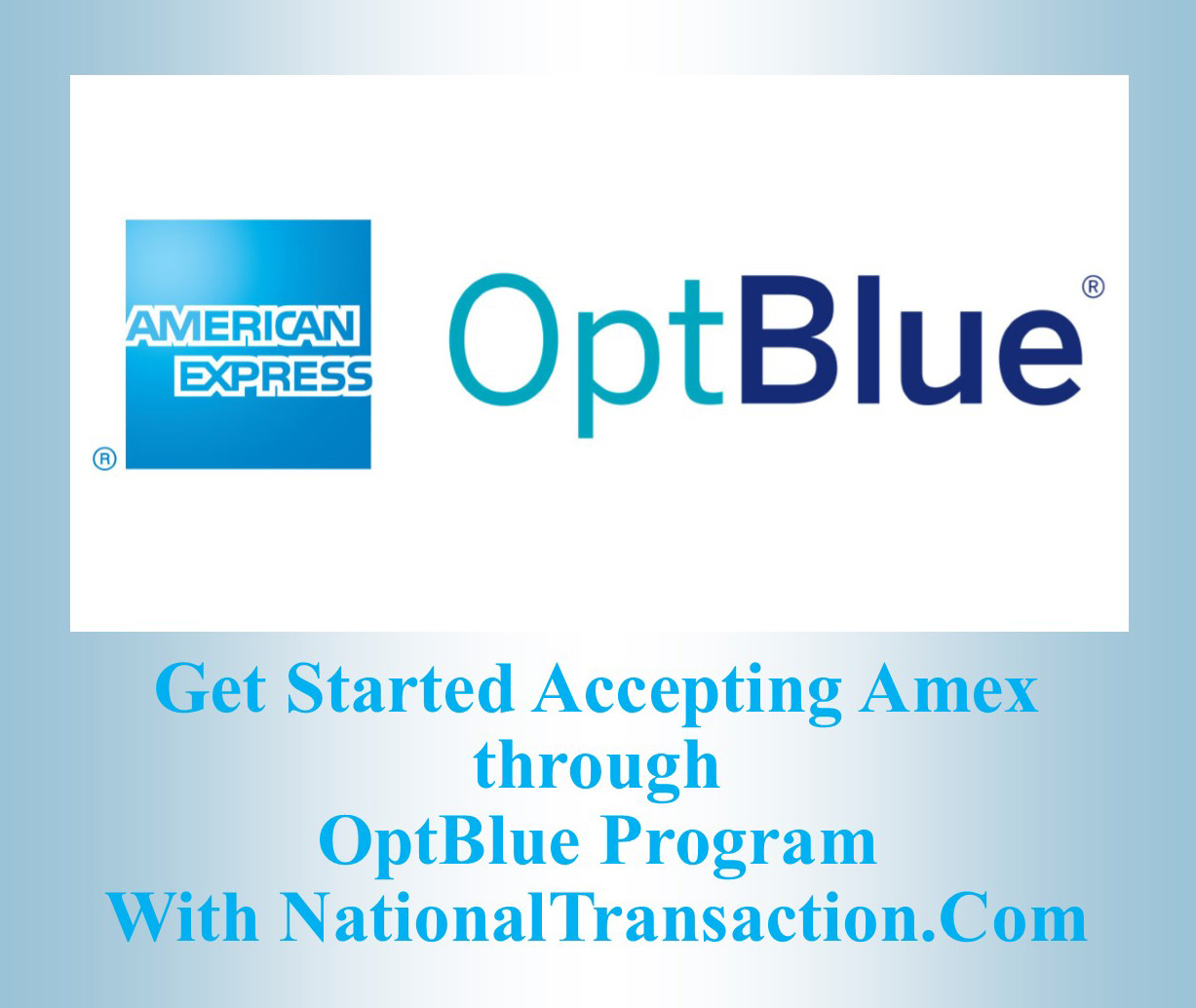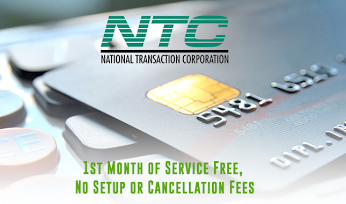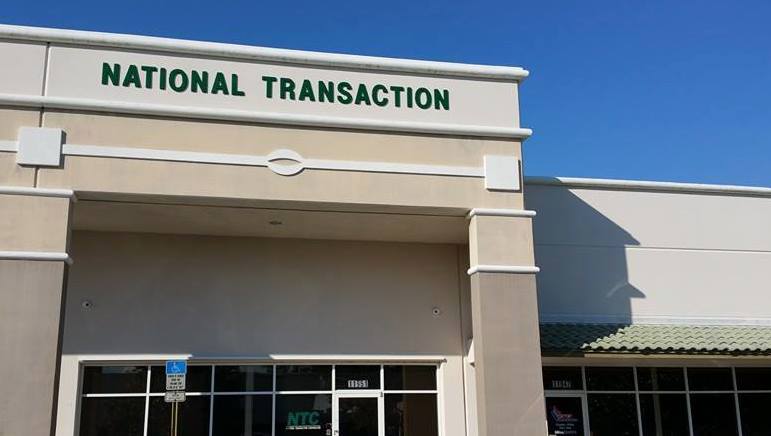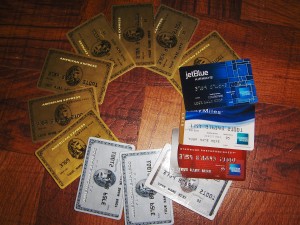
April 18th, 2017 by Elma Jane
NTC Amex OptBlue Program rate are a lot more competitive, with NTC Amex OptBlue you can find a rate that’s right for your business and a faster, easier way to accept the card.
Amex OptBlue Program allows smaller businesses to accept American Express credit cards without paying excessively higher rates. Those who sign up for this program can automatically bundle American Express along with the other major card brands that they already accepting.
Before Optblue, you had one rate option for American Express Card acceptance. Now, because your Merchant Service Provider sets the rate, you could find a deal that works for you.
In some cases, Amex OptBlue is lower than Visa and MasterCard.
If you’re an existing merchant adding Amex Optblue is easy with NTC. You’ll get paid at the same time as your other card brands. One fast deposit!
All the credit cards you accept in one simple statement.
One Customer Service Contact. We can answer questions for every card you take with us.
Give us a call now 888-996-2273 or fill out the form NationalTransaction.Com and we’ll help you get going with Amex OptBlue.
Posted in Best Practices for Merchants Tagged with: amex, card, MasterCard, merchant, payment processing, service provider, visa

December 22nd, 2016 by Elma Jane
What is a Merchant Account?
If you want to remain competitive virtually, every business needs access to a merchant account to accept card payments from their customers. “Merchant” is another word for a seller or business owner. Merchant accounts are not depository accounts like checking and savings accounts; they are considered a line of credit. This allows a merchant to receive funding for the credit transaction. Therefore, when a customer pays with a credit card; a bank is extending credit to that customer and also making the payment on his/her behalf. As for payment providers or processors; they pay merchants before the banks collect from customers and are therefore extending credit to the merchant, that’s why Merchant account is considered as a LOAN.
Merchant account helps facilitate the complex interactions that need to occur between your business and your customer, the credit card networks (Amex, Discover, MasterCard, Visa) and your payment provider every time you receive a card payment. It helps to ensure that you receive funding as quickly as possible, that the banks are protected from losses, and that buyers are protected from scams. Everyone is held accountable based on the rules of the credit card processing agreement with a merchant account.
There’s cost associated in taking credit cards, but it’s much easier and more secure to open a merchant account than it is to keep a book of credit accounts for all of your customers!
Posted in Best Practices for Merchants, Travel Agency Agents Tagged with: amex, card, credit, customers, Discover, loan, MasterCard, merchant account, payment provider, payments, transaction, visa

October 20th, 2015 by Elma Jane
We’ve covered a lot about EMV, but what about improving security for online and Card-Not-Present transactions? That’s where 3-D Secure comes in.
3-D Secure allows a card holder to authenticate himself while making an online payment.
In a traditional credit card transaction, a payment request is presented to the issuing bank for authorization. The Issuing bank authorizes the transaction based solely on the funds available to the card holder.
With card present, the magnetic strip on the card can be read and a signature collected. This process has now been largely superseded by Chip and PIN which gives the card holder the opportunity to identify himself via a secret PIN code.
An E-commerce transaction is conducted online, without the possibility to access the card physically. Un-authorized usage and fraud are therefore more likely.
3-D Secure allows transactions to be conducted in safety online, greatly reducing the risk of fraud and chargebacks.
How 3-D Secure Works?
When a payment request arrives at the merchant or payment gateway, the Merchant Plug In (MPI) component is activated. The MPI talks to Visa or MasterCard to check if the card is enrolled for 3-D Secure. If the card is not enrolled, this means that either the bank that issued the card is not yet supporting 3-D Secure or it means that the card holder has not yet been registered for the service. If the card is enrolled, the MPI will redirect the card holder to the 3-D Secure authentication web page for the issuing bank; the card holder will then identify himself. The MPI will evaluate the reply from the bank and, if successful, allow the transaction to proceed for authorization. The transaction could still fail for lack of funds or other reasons but is more likely to be approved because of the authentication.
3-D Secure allows 3 domains to work together.
Domain 1: The card holder has the peace of mind that his card is not used without his authorization.
Domain 2: Merchants are protected from fraud and can provide the product and service without delay or extra costs.
Domain 3: Banks see that the transaction has been authenticated and are more likely to approve the transaction, to the convenience of the card holder.
Implementation of 3-D Secure:
Visa is called Verified by Visa.
MasterCard is called Secure Code.
Amex is called SafeKey.
JCB is called J/Secure.
Posted in Best Practices for Merchants, e-commerce & m-commerce, Internet Payment Gateway Tagged with: 3-D Secure, amex, card holder, card present, card-not-present, chargebacks, Chip and PIN, credit card, ecommerce, EMV, fraud, jcb, magnetic strip, MasterCard, merchant, online payment, payment gateway, pin code, visa

October 15th, 2015 by Elma Jane
There are numbers of guidelines issued for accepting card payments, and merchants are expected to understand them all. To avoid issues down the road know a few basic rules in order to keep your business going without being penalized.
There’s a lot of ways to process a credit card: In-store, online, and by phone. There’s also different ways to pay and different brands of cards.
In-store and Card-not-present policies.
In-Store Policies:
- Always verify that the person presenting the card is the cardholder
- Ask for a 2nd ID for comparison
- Cards are non-transferable, cardholder MUST be present for purchase
- Compare the signature on the back of the card with that of the person who presents the card
- Inspect the card to confirm that it’s not visibly altered or mutilated
- Validate the card’s expiration date
Online/Phone Payment Policies: Card-not-present transactions
- Card account number
- Card billing address
- CID (3 digits on back of card OR 4 on the front)
- Card expiration date
- Card member’s home or billing telephone number
- Card member name (as it appears on the Card)
Rules for Visa, MasterCard and Amex that merchants need to know:
- Never store cardholder data on any systems to help minimize the risk of fraud and protect your business from potential chargebacks.
Complying with Federal Laws, State Laws and PCI
- A merchant should be familiar with and abide by Federal Laws regarding accepting credit cards. The Fair Credit Reporting Act is the federal law that establishes the foundation of consumer credit rights. This law regulates the collection and use of consumer credit information by merchants.
- Check state laws on the use of consumer credit information and accepting credit cards. Not all states have additional laws that regulate credit card practices, but some (such as California) prohibit merchants from requesting/requiring a customer to provide any personal information (like their address or telephone number) on any form involved with their credit card transaction. So, it is advised that merchants inquire about further information in their particular state.
- The Payment Card Industry Data Security Standard (PCI DSS) is a set of requirements designed to ensure that all companies processing, storing, or transmitting credit card information uphold a secure environment. These rules essentially apply to any merchant that has a Merchant ID (MID). If you are a merchant that accepts credit card payments, you are required to comply with the PCI Data Security Standard, large or small businesses.
EMV Liability Shift Set By Visa and MasterCard as of October 1st
U.S. banks and credit card companies are now using the EMV (Europay, MasterCard, and Visa) technology. The EMV liability shift for fraud carried out in physical stores with counterfeit cards belongs to the merchant if it has not yet upgraded its POS system to accept EMV-enabled chip cards. While issuers absorb losses under card-network rules, that burden will shift to acquirers in cases where the fraud occurs at merchants unprepared for EMV.
It’s good to know every aspect of your business. The above guidelines are part of a business that every merchants should be familiar with. The main reason for these rules is to protect your business and keep your customer’s payment card data safe and secure.
To start accepting more credit cards give us a call now at 888-996-2273. We have the latest terminals that’s EMV/NFC capable.
Posted in Best Practices for Merchants, Credit Card Security, EMV EuroPay MasterCard Visa, Payment Card Industry PCI Security Tagged with: amex, card network, card payments, card-not-present, chargebacks, chip cards, credit card, credit card companies, Data Security Standard, EMV, EuroPay, MasterCard, merchants, MID, Payment Card Industry, PCI-DSS, POS system, U.S. banks, visa
June 16th, 2014 by Elma Jane
Credit card companies are racing against tech giants like Apple and Google to create what would thin our wallets forever. The race, which started to replace paper with plastic, is now entering a new phase of combining our cell phones and credit cards. Credit card giant American Express is working on developing a next generation app, which would let consumers shop using their virtual credit cards just like virtual boarding passes on an iPhone Passbook. Amex doesn’t stand alone in the race. Google, Square and Apple are some of the many companies in Silicon Valley, which are working on taking the leap. While Google Wallet and PayPal are some of the available products providing customers with a virtual wallet experience. The credit card companies still continue to benefit being the point of sale for these products. This puts Amex in a unique position, as it doesn’t have to struggle becoming the card customers choose to use. Amex is just a jump away in moving from customers’ wallet to cellphone.
Posted in Best Practices for Merchants, Visa MasterCard American Express Tagged with: American Express, amex, app, Apple, card, cellphone, credit-card, customers, google, Iphone, virtual credit cards, wallet
May 7th, 2014 by Elma Jane

NTC’s New Approach On Payment Processing brings Client Satisfaction
About NTC (National Transaction Corporation)
NTC is a credit card processing company that was built uniquely. Combining leading edge technology with passion for customer service, as well as service to help customers maximize the value of their merchant service program. NTC provides sales agents, financial institutions and merchants with benefits not available from other providers, such as next day funding with a late cut-off time and unparallel graphical and web-based reporting.
To learn more visit http://www.nationaltransaction.com or call 888-996-2273.
Marking a 65% increase over 2012 NTC now serves approximately 15,000 businesses.
This rapid growth was driven by the many unique benefits that NTC offers its merchants and sales partners, ranging from best technology to superior customer service.
The major differentiators made possible by NTC’s proprietary back-end processing system is the Next Day Funding Service. Because NTC connects directly to the following: Amex, Discover, MasterCard and VISA. This way sales partners and merchants are able to avoid the middleman and go straight to the source of all their processing needs. This also means that the merchants can batch out their terminal POS with one of the latest cut-off times in the industry by as late as 11:00 pm Eastern.
NTC’s another appealing factor to new sales partners and merchants is its merchant connect online reporting system. It provides 24/7 access to graphical account information through a system that is fast easy and secure. Merchants are now able to clearly see and understand their payment processing costs. ISO’s have access to sugar CRM to make notes and see Merchant Marketing Data. Card Numbers are secure on the banks server so our faculty has credentials to access the bank servers.
Independent sales organizations (ISOs) and Merchant sales professionals continue to choose NTC as their payment processing partner to obtain these unique benefits. In addition to industry-leading technology, NTC offers its merchants and sales partners a level of personalized support that is not easily found among other credit card processing companies. They get round the clock account and terminal support. Collective hard work and determination helped NTC grow faster in the industry, resulted in more loyal ISO sales partners who are submitting more applications. Looking forward for continued success for NTC, its sales partners and merchants.
Posted in Credit card Processing, EMV EuroPay MasterCard Visa, Financial Services, Merchant Account Services News Articles, nationaltransaction.com, Point of Sale, Visa MasterCard American Express Tagged with: amex, back-end processing, bank, bank servers, card, card numbers, credit card processing, credit-card, customer service, Discover, financial institutions, marketing data, MasterCard, merchant, merchant connect, merchant service, next day funding, payment processing, POS, provider's, sales agents, sales partners, sugar CRM, terminal, visa, web-based
October 22nd, 2013 by Elma Jane
American Express cardmembers can now use their accumulated loyalty points to pay for taxi fares in New York City through a partnership with VeriFone.
The programme will roll out on VeriFone’s in-taxi devices that process more than 200,000 payments a day in more than 7000 cabs throughout NYC.
Leslie Berland, senior vice president, digital partnerships and development at American Express, says: “With this announcement, we’re leveraging our unique technology to bring it to life at the most critical commerce touchpoint – the physical point of sale.”
The integration is currently limited to New York taxis, but it doesn’t take a great stretch of the imagination to see it expanded to include other VeriFone point-of-sale systems.
At the end of the ride, AmEx members who have chosen to pay by card will be given the option to use points for their ride fare, including tip and tolls.
Posted in Credit card Processing, Electronic Payments, Gift & Loyalty Card Processing, Visa MasterCard American Express Tagged with: American Express, amex, card, cardholders, cardmembers, commerce, devices, digital, fares, integration, loyalty, new york, nyc, partnership, payments, point of sale, points, reward, systems, taxi, tip, tolls, touchpoint, verifone






